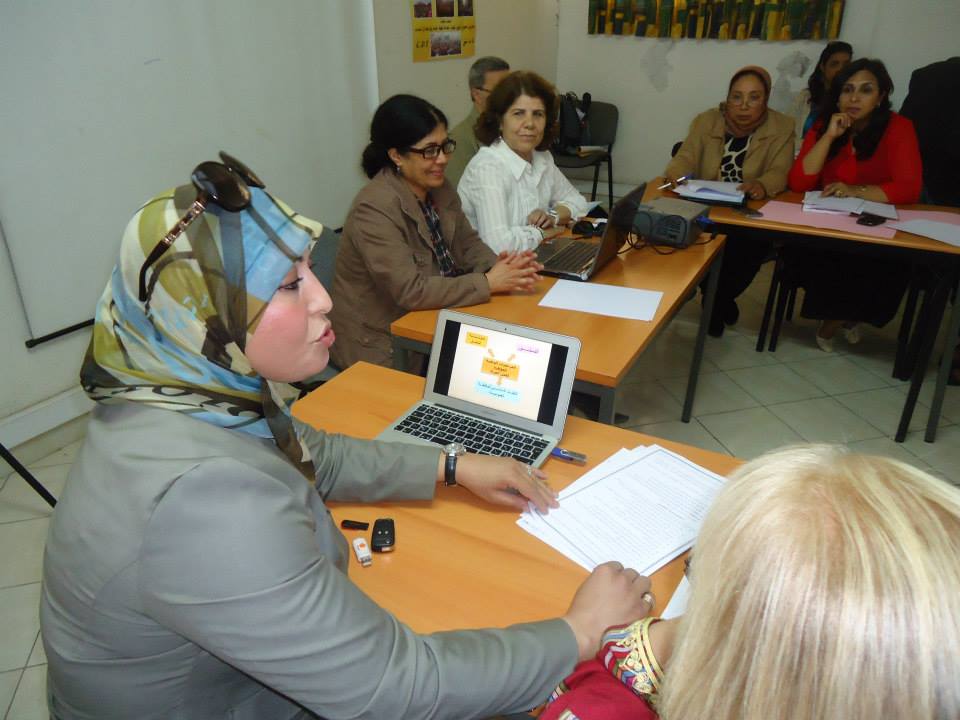In Algeria, Tunisia and Morocco, women are taking concrete steps through unions to achieve social and economic justice and decent work, achievements possible when women are substantively involved in decision-making in their unions, their community and civil society.
In Algeria, the Women’s Committee of the Syndicat National Autonome des Personnels de l’Administration Publique (SNAPAP) has reached out to 600 marginalized and vulnerable women across 11 provinces through educational outreach and study circles. SNAPAP leadership recognizes that despite women’s active social and economic participation, they still face blatant discrimination in their workplaces and communities, harassment, violence, and exploitation on the job.
The Women’s Committee runs study circles with the Regional Algerian Women’s Legal Empowerment Network and with support from the Solidarity Center. During study sessions, the women learn their legal rights under national laws and international conventions. They also are supported in overcoming fears that keep them from challenging repression and violations of their rights, even those often condoned by their societies.
Amid ongoing global economic insecurity, millions of workers are struggling to find jobs that pay a living wage—and the most vulnerable are women, who are more likely to toil in jobs without coverage under formal labor law or social protections, leaving them open to discrimination and exploitation.
The study circles provide a safe place where women can freely talk about their experiences. In recent months, they have described ongoing exploitation in the workplace and at home. All have detailed low wages, long working hours, abusive transfers and dismissals, discrimination, sexual harassment, physical violence and a lack of social protection.
A woman union activist from Adrar, in southwest Algeria, describes how women workers struggle economically in the region, despite the country’s oil and gas wealth. To survive in Adrar, some women work in stone quarries using their bare hands to fill trucks with rocks and gravel for private sellers. Three women recently died from dehydration.
“Surprisingly, all the basic rights that women should enjoy, such as health coverage and decent living wages, are not being enjoyed by women of the south. Some women tried to change their situation through training, but their certificate of completion was rejected by all the businesses and enterprises in the south, which led women to be marginalized,” said the activist. She added that the women, “work in an unsafe environment and are vulnerable to harassment.”
In Tunisia, where women are playing a key role in enshrining articles in the constitution that guarantee equality and parity, women in the Union Générale Tunisienne du Travail (General Union of Tunisian Workers, UGTT) are now working to advance women’s roles in their union. They are uniting under the theme, “Partners in social activism, partners in decision-making,” to highlight their essential role in the country’s 2010–2011 uprising and the subsequent democratic transition. UGTT women are campaigning for creation of a quota that would ensure women comprise a minimum percentage of elected officers and members of UGTT decision-making bodies.
Women union members also have been active in UGTT’s push to remove all of the country’s reservations to the United Nations on the Convention on the Elimination on all Forms of Discrimination against Women (CEDAW). These reservations had enabled Tunisia to opt out of certain provisions, including women’s rights within the family, even though the country had ratified the treaty.
The Confederation Democratique du Travail (Democratic Labor Confederation, CDT) in Morocco is laying the groundwork for a gender advocacy campaign to ensure the consistent application and enforcement of women’s rights. The CDT’s Women’s Committee is laying the groundwork to “give more visibility to the demands of women workers.” The CDT released a memorandum, “Work is a right, with guaranteed dignity and equality,” at a well-attended press conference last month and plans a coordinated workers’ advocacy campaign for women workers.

